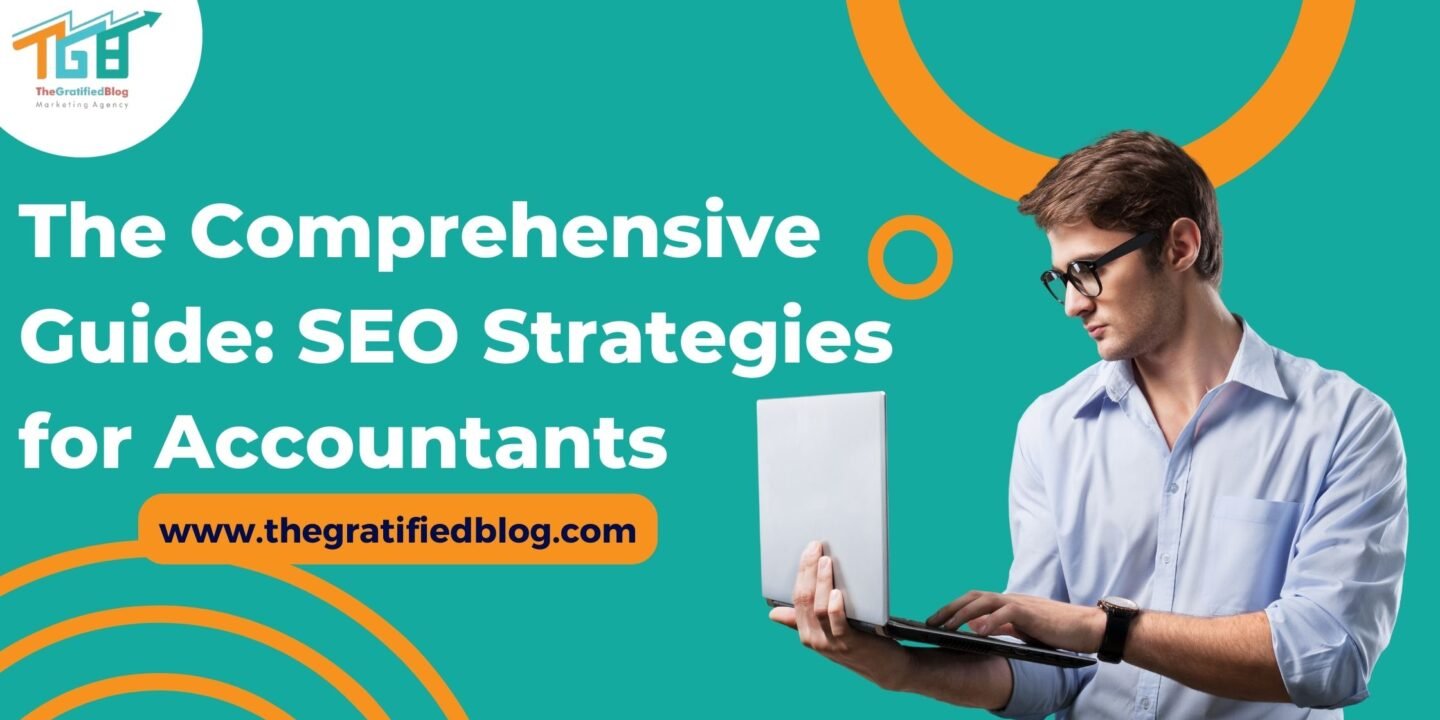
In today’s digital age, acquiring clients has shifted online. As an accountant, ensuring your firm’s visibility in this digital landscape is crucial. Unlocking the potential of SEO is essential for making your accounting services discoverable by potential clients.
In this guide, we’ll explore how SEO for accountants can transform your online presence. Whether you’re an established accountant or new to the field, this guide will equip you with the tools to effectively navigate the digital world, from keyword research to website optimization and local SEO. Let’s embark on a journey to improve and enhance your online presence and position your firm as a reputable, reliable
financial resource.
What Is SEO For Accountants?
“SEO for Accountants” refers to a specialized branch of Search Engine Optimization (SEO) customized to address the distinctive needs and challenges that accounting professionals and firms encounter. Optimizing a website is the practice of SEO and improving its online visibility to achieve higher rankings in search engine results pages (SERPs) when users search for relevant keywords or phrases. For accountants, implementing effective SEO strategies can increase online visibility, attract potential clients, and ultimately grow their business.
Search engine optimization (SEO) is crucial for accounting services, just like any other business; enhancing online visibility aids in drawing potential clients to their website. SEO services for accountants involve tailoring strategies to the specific needs of accounting professionals.
Importance Of SEO For Accountants
- Enhanced Visibility: SEO for accountants increases the visibility of your accounting firm online, increasing the probability that potential clients will discover your services when searching for relevant keywords.
- Credibility and Trust: Implementing effective SEO strategies contributes to building credibility and fostering trust in the perception of both search engines and users. A well-optimized website is more likely to be considered authoritative.
- Competitive Edge: In a competitive industry, SEO gives your accounting firm a competitive edge by ensuring it ranks higher in search engine results. This can increase website traffic, client inquiries, and overall business success.
6 Best SEO Strategies For Accountants
Here’s what “SEO for accountants” typically involves:
Step 1: Conducting Keyword Research
Conducting keyword research is essential in every SEO strategy, including SEO keywords for accountants. It includes identifying and choosing the most pertinent and practical keywords that potential clients will likely use when searching for accounting services. Let’s explore the importance of keyword research and examples of accounting-related keywords.

Importance of keyword research for accountants:
- Relevance: Keyword research helps you pinpoint the terms and phrases directly related to accounting services. This ensures that your website and content align with what potential clients are searching for.
- Competitive Advantage: By identifying niche and long-tail keywords specific to accounting, you can target a less competitive market, making ranking higher in search engine results easier.
- Audience Understanding: Keyword research provides insights into your target audience’s pain points, questions, and needs. This understanding can shape your content development and client-focused messaging.
- ROI: Investing in SEO keywords for accountants can generate a greater return on investment (ROI) because you are reaching an audience actively seeking your services.
- Content Strategy: It informs your content strategy, helping you create valuable articles, blog posts, and resources that cater to the interests and concerns of potential clients.
Examples of Accounting-Related Keywords:
- Tax Preparation Services
- Certified Public Accountant (CPA)
- Small Business Accounting
- Auditing and Assurance Services
- Financial Consulting
Step 2: On-Page SEO Optimization
On-page SEO optimization is enhancing the individual web pages on your site to enhance their search engine rankings and overall visibility.

Here’s how you can optimize website content for SEO in the context of accounting services:
- Title Tags: It is one of the most critical on-page SEO elements. Incorporate relevant keywords into the title tag while ensuring it remains clear and compelling for human readers. For example, if your target keyword is “Tax Preparation Services in New York,” your title tag could be “Expert Tax Preparation Services in New York: [Your Accounting Firm Name].”
- Header Tags (H1, H2, H3): Use header tags to structure your content logically and include keywords where relevant. The main title of your page (H1) should ideally contain the primary keyword. Subheadings (H2, H3) can control related keywords or support the main topic.
- Body Text: Integrate keywords naturally throughout the body of your content. Avoid keyword stuffing; Rather than that, concentrate on delivering valuable and informative content that meets the user’s inquiry. While naturally incorporating keywords. Write for the reader first and optimize second.
- Alt Tags (Image Descriptions): When you use images on your website, include descriptive alt tags. Not only do these help visually impaired users, but search engines also consider alt tags when determining the content and context of images. Include relevant keywords in alt tags when appropriate, but always ensure they accurately describe the image. For instance, if you have an image of a tax consultant, the alt tag could be “Tax Consultant at Work.”
In addition to these elements, remember to optimize other on-page factors like URL structure (including keywords when feasible), internal linking (linking to related pages within your site), and providing a user-friendly experience (fast-loading pages, mobile responsiveness).
Step 3: Creating High-Quality Content
High-quality content is crucial for every website, especially for accounting firms aiming to improve their online presence.
Here’s why informative and engaging content matters and how to achieve it:
Significance of Informative and Engaging Content:
- Demonstrates Expertise: High-quality content showcases your knowledge and expertise in accounting. It helps establish your firm as a trusted authority in the field, which can attract potential clients seeking reliable financial services.
- Builds Trust: Well-researched and informative content builds trust with your audience. When users discover valuable information on your site, they are inclined to trust your firm with their financial matters.
- Educates and Informs: Accounting-related content can educate clients on financial topics, tax regulations, and accounting best practices. Informed clients are more likely to make sound financial decisions.
- Improved SEO: Search engines reward websites with valuable, regularly updated content. Compelling content can enhance your rankings in search engines, increasing your online visibility.
- Encourages Sharing: Engaging content is more likely to be shared on social media and linked from other websites, increasing your website’s authority and traffic.
Ideas for Accounting-Related Blog Topics:
- Tax Planning Strategies for Small Businesses: Discuss tax-saving strategies that small business owners can implement.
- Standard Tax Deductions for Individuals: Educate individuals on potential deductions they may overlook during tax season.
- Understanding Financial Statements: Provide a comprehensive guide to gaining insights into income statements, balance sheets, and cash flow statements.
- Navigating Tax Changes: Keep clients informed about changes in tax laws and how they might impact their financial situation.
- Retirement Planning Tips: Offer advice on retirement planning, including 401(k)s, IRAs, and pension plans.
Producing content that is of high quality, informative, and engaging is essential for accounting firms. It helps build trust, educates clients, improves SEO, and keeps your website competitive. Regularly updating your content ensures you remain relevant in a constantly evolving financial landscape.
Step 4: Building Backlinks
Backlinks, also called inbound or external links, play a vital role in SEO for accountants and any other business. They are links from other websites that point to your website.

Here’s an explanation of their role, strategies for acquiring quality backlinks, and the importance of avoiding low-quality or spammy backlinks.
Role of Backlinks in SEO:
- Authority and Trust: Search engines view backlinks as votes of confidence from other websites. When reputable and authoritative When other websites link to your content, it signals to search engines that your content is trustworthy and valuable.
- Improved Rankings: High-quality backlinks can positively impact your website’s search engine rankings. Websites with robust backlink profiles typically attain elevated positions in search results for pertinent keywords.
- Referral Traffic: Backlinks can drive direct referral traffic to your website. Individuals who select a hyperlink from another website to yours become clients or customers.
Strategies for Acquiring Quality Backlinks:
- Create Outstanding Content
- Guest Posting
- Outreach and Relationship Building
- Content Promotion
- Resource Pages
Building high-quality backlinks is essential for SEO in the accounting field. They can boost your website’s authority, improve rankings, and drive referral traffic. However, it’s crucial to focus on acquiring quality links through ethical and reputable strategies while avoiding low-quality or spammy backlinks to maintain a positive online reputation and SEO performance.
Step 5: Local SEO for Accountants
Local SEO is paramount for accounting firms as it enables them to target potential clients locally.

Here’s why local SEO is crucial for accounting firms, how to optimize Google My Business (GMB) listings, and tips for obtaining online reviews and ratings:
Optimizing Google My Business (GMB) Listings:
- Claim and Verify Your GMB Listing: If you haven’t already, claim your GMB listing. To confirm your listing, Google will dispatch a verification code to your business address or phone number.
- Complete All Information: Fill out every section of your GMB listing accurately. Verify that your business name, address, phone number (NAP), website, and business hours are up-to-date.
- Select the Right Categories: Choose the most relevant categories for your accounting services. Google uses categories to understand your business and display it in relevant search results.
- Add High-Quality Photos: Upload high-resolution images of your office, team,
- and services. Incorporating visual content can enhance the appeal and trustworthiness of your listing.
- Write a Detailed Business Description: Craft a comprehensive business description that outlines your services, experience, and what sets your firm apart.
- Promote Customer Reviews: Urge content customers to share their reviews on your GMB listing. Positive reviews can enhance your online reputation.
- Regularly Update Posts: Use GMB posts to share updates, events, promotions, and other relevant information. This keeps your listing fresh and engaging.
Tips for Obtaining Online Reviews and Ratings:
- Ask Satisfied Clients: Politely ask satisfied clients to leave reviews on platforms like Google, Yelp, and industry-specific directories. Simplify the process for them by offering direct links.
- Provide Excellent Service: Delivering exceptional service is the best way to get positive reviews. Satisfied clients are inclined to share their positive experiences.
- Manage Reviews: Respond to both favorable and unfavorable feedback. Express gratitude for positive comments and attend to concerns professionally raised in negative reviews. This shows that you value client feedback.
- Offer Incentives with Caution: Be cautious when offering incentives for reviews, as some platforms have strict policies against it. Always follow the guidelines of the review platform.
- Monitor and Manage Reviews: Regularly monitor your online reviews and address any issues promptly. Addressing negative feedback and resolving issues can demonstrate your commitment to client satisfaction.
Incorporating these local SEO strategies and maintaining an optimized GMB listing with positive online reviews can help accounting firms enhance their online visibility, attract local clients, and build trust in their communities.
Step 6: Technical SEO For Accountant’s Considerations
It forms the basis for a thriving online presence. Here, we’ll discuss critical technical aspects accounting firms should consider to improve their website’s performance and search engine rankings.
A. Website Speed and Mobile-Friendliness:
- Website Speed: A fast-loading website is essential for user experience and SEO. Google considers speed as a factor in its ranking algorithm factor. Use tools like Google PageSpeed Insights or GTmetrix to assess and optimize your website’s speed. Compress images, minimize code, and enable browser caching to improve load times.
- Mobile-Friendliness: Many users access websites on mobile devices. Ensure your website is responsive and mobile-friendly. Google considers page speed to be a ranking factor. Utilizing tools like Google PageSpeed Insights or GTmetrix to mobile-friendly sites can improve user engagement. Use Google’s Mobile-Friendly Test to check your site’s mobile compatibility.
B. Site Structure and Navigation:
- Clear Hierarchy: Design a clear website hierarchy with well-organized categories and subcategories. This aids in providing clarity to both users and search engines about your site’s structure.
- Internal Linking: Establish connections between related pages using internal links on your website. This improves user navigation and helps search engines discover and index your content more effectively.
- Breadcrumb Navigation: Implement breadcrumb navigation to show users their path within your website. Breadcrumbs also improve the user experience and enhance search engine understanding of your content.
- XML Sitemap: Submit an XML sitemap to search engines, which comprises a file listing all your site’s pages, facilitating search engines in crawling and indexing your content efficiently.
Incorporating these technical SEO considerations, optimizing your website for speed and mobile friendliness, maintaining a logical site structure, and regularly conducting technical SEO audits with the help of these tools will contribute to better search engine rankings and a superior user experience for visitors to your accounting firm’s website.
FAQs
Q1. How can accountants benefit from local SEO?
A. Local SEO focuses on optimizing your online presence for local searches. Accountants can leverage local SEO to target clients in their geographical area, making it easier for potential clients to find them when searching for accounting services locally.
Q2. What are some key on-page SEO elements for accountant websites?
A. On-page SEO elements include optimizing meta titles, descriptions, header tags, and ensuring content is relevant and valuable. For accountants, incorporating relevant keywords related to accounting services is essential.
Summing Up
The prosperity of your accounting firm depends on its online presence. SEO for accountants is the key to ensuring potential clients can locate your services when they need them the most. Applying the strategies detailed in this guide can enhance your online visibility, build credibility, and ultimately grow your client base.
Now, it’s your turn. Have you tried any of these SEO techniques for your accounting firm? What results have you achieved? We’d love to hear about your experiences and answer any questions you have. Feel free to share your thoughts in the comments below, and let’s continue the conversation on how SEO can transform your accounting practice.








No Comments